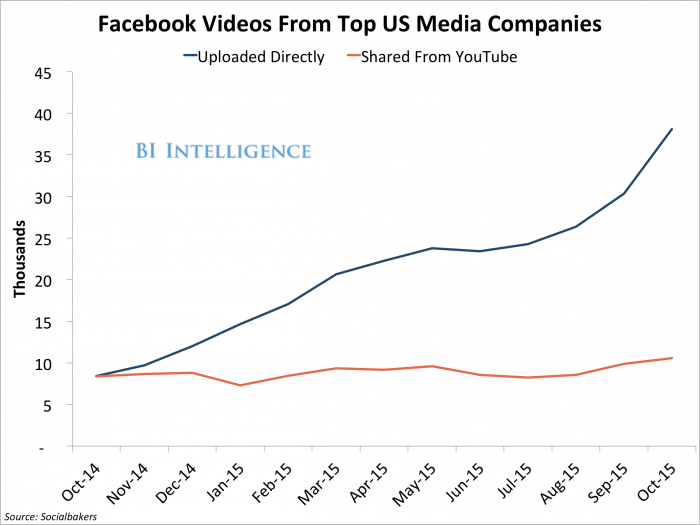YouTube faces challenges as media companies turn to Facebook (GOOG, GOOGL, FB)

BII
This story was delivered to BI Intelligence "Digital Media Briefing" subscribers. To learn more and subscribe, please click here.
Some media companies – including NowThis, The Washington Post, and Hometalk – have shifted their video focus away from YouTube and onto Facebook, The Wall Street Journal reports.
The prospect of large audiences, algorithms that favor video, and strong financial incentives are the some of the chief factors driving this movement.
Facebook's inherently social nature is critical to its video success. Built-in sharing and messaging features and the centrality of the News Feed facilitate the discovery and diffusion of video on the platform. Users effortlessly stumble on videos, even if doing so is not their original intent. In contrast, YouTube's serves primarily a search engine for videos, where users actively seek out content in a much more deliberate way.
Here are other comparative advantages that Facebook holds over YouTube in the eyes of media companies:
A larger "pure" audience of over 1.6 billion registered users. YouTube has more than a billion users, but not all of them are logged-in. This cause some to view Facebook as providing a larger audience potential.
Lenient criteria for viewability, which in turn quantify success. Facebook counts a video view after three seconds of play-time, even as videos in the News Feed auto-play without sound. YouTube, on the other hand, only counts a view after the 30-second mark. Facebook’s lax criteria for counting views plays to its advantage and to other media companies its platform, but not to advertisers who seek true viewability.
Ad-revenue share agreements, and direct payments for some. YouTube’s sole revenue mechanism for creators is through revenue-share on pre-roll ads, with creators keeping a 55%. Facebook does not have pre-roll ads, but runs the revenue-split on ads that run at the end of a video clip, before the screen goes to "suggested videos." Facebook is also paying select media companies directly to produce video on its platform, but whether this is sustainable for Facebook in the long-run remains to be seen.
On the other hand, YouTube also has certain advantages. Its video viewing experience tends to be more immersive, whereas Facebook's is conducive to leisurely consumption on the side. After all, 85% of videos on Facebook are watched without sound. YouTube thus serves as a more complete, cinematic experience than Facebook. This strength fosters an environment where creators can have more direct, engaged and loyal relationships with their audiences over time.
To receive stories like this one directly to your inbox every morning, sign up for the Digital Media Briefing newsletter. Click here to learn more about how you can gain risk-free access today.
See Also:

 Yahoo News
Yahoo News 

